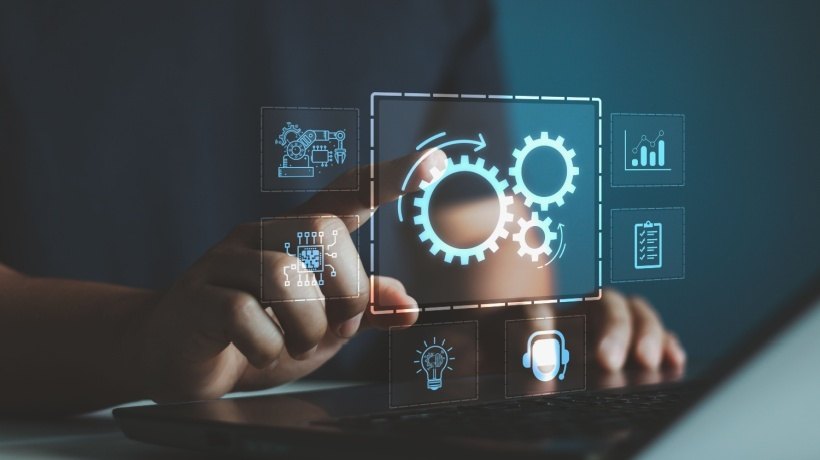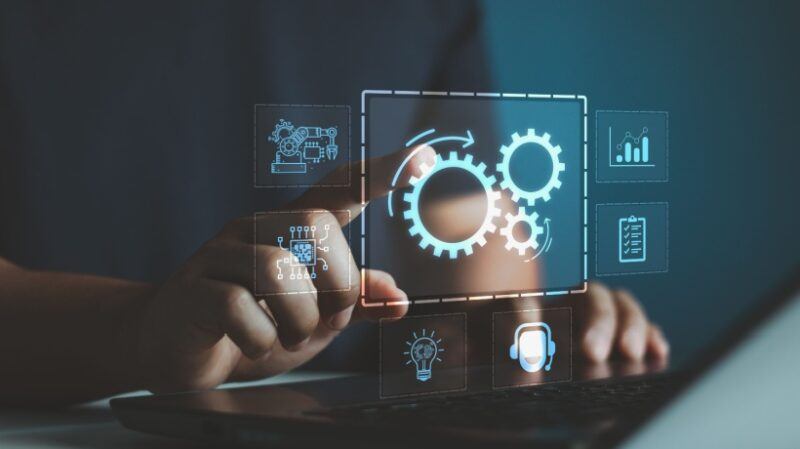The Shift In the direction of Automation In Routine Duties
Synthetic Intelligence (AI) is automating repetitive and mundane duties throughout industries. Automation reduces errors, will increase effectivity, and allows staff to deal with artistic and strategic roles. This shift within the office brought on by AI and its results on the way forward for work is most evident in manufacturing, knowledge processing, and customer support.
AI And The Future Of Work
Manufacturing Sector Transformation
Automated meeting traces and AI-driven high quality management techniques dominate manufacturing. Robots deal with repetitive duties like welding and packing, which boosts productiveness. Nevertheless, this reduces the demand for handbook labor in factories. Employees are transferring in the direction of roles that oversee or preserve these automated techniques.
Buyer Service Redefined
Chatbots powered by AI at the moment are managing routine buyer inquiries. This development reduces the workload for human brokers and allows them to deal with complicated buyer points. Whereas automation can displace some jobs, it additionally creates alternatives for these expert in AI help system upkeep and programming.
Challenges And Alternatives
As AI takes over routine duties, staff should adapt to remain related. Upskilling and reskilling applications turn into important, providing coaching in areas comparable to AI oversight, moral programming, and inventive problem-solving.
The Rise Of Hybrid Work Fashions
Hybrid work, a mix of distant and in-office work, is changing into extra prevalent. AI instruments have performed a essential position in enabling this shift by facilitating communication, collaboration, and productiveness.
AI-Powered Collaboration Instruments
Platforms like AI-driven challenge administration techniques and digital assistants are serving to groups work effectively. These instruments analyze workloads, set priorities, and even schedule conferences primarily based on availability.
Distant Monitoring Programs
Employers use AI to watch worker efficiency and productiveness remotely. Whereas some staff welcome the transparency, others specific issues about privateness. Discovering a stability between oversight and autonomy is essential for hybrid work success.
Future Implications
The hybrid mannequin permits for better flexibility, which boosts job satisfaction and retention. Nevertheless, staff must develop digital literacy to navigate AI-powered instruments successfully.
Rising Job Roles In AI-Pushed Industries
Whereas AI is automating some jobs, it is usually creating new roles. These rising roles require technical experience, creativity, and flexibility.
AI Specialists
Engineers, knowledge scientists, and Machine Studying specialists are in excessive demand. They design, practice, and deploy AI techniques, guaranteeing they function successfully and ethically.
Moral Advisors
With AI’s rising affect, moral issues are gaining consideration. Moral advisors guarantee AI techniques adjust to societal values, privateness norms, and authorized necessities.
Inventive Roles In AI-Enhanced Fields
AI is revolutionizing artistic industries like advertising and design. Professionals expert in utilizing AI instruments for creating personalised content material and designs are extremely wanted.
Upskilling As A Necessity For Profession Progress
To thrive within the AI-driven job market, staff should spend money on steady studying. Upskilling applications are essential for profession development and job safety.
Studying Technical Expertise
Programs in coding, AI programming, and knowledge evaluation are extensively obtainable. These expertise are important for roles in AI administration and growth.
Growing Gentle Expertise
Creativity, emotional intelligence, and significant considering are equally vital. AI can not replicate these human qualities, making them invaluable within the office.
Company Initiatives
Firms are partnering with instructional establishments to offer tailor-made coaching applications. These initiatives assist staff transition easily into AI-enhanced roles.
The Influence On Conventional Jobs
AI’s integration into the office is affecting conventional roles, from administrative positions to healthcare. Whereas some jobs face displacement, others are evolving.
Administrative Roles
Duties like scheduling and knowledge entry are more and more dealt with by AI. Employees in these fields are pivoting in the direction of roles requiring strategic considering or consumer interplay.
Healthcare Developments
AI-powered diagnostics and robotic surgical procedures are enhancing affected person outcomes. Nurses and docs are adopting new applied sciences to offer higher care, requiring ongoing coaching and flexibility.
The Gig Economic system And AI Integration
The gig economic system, characterised by short-term contracts and freelance work, can also be evolving attributable to AI. Platforms like ride-sharing apps and freelance marketplaces rely closely on AI for effectivity.
Enhanced Matching Algorithms
AI improves the matching of staff to purchasers or duties. This reduces wait instances and will increase job satisfaction.
New Alternatives In The Gig Area
Freelancers expert in AI-based instruments, comparable to graphic design software program or knowledge evaluation applications, are thriving. AI’s position within the gig economic system highlights the necessity for staff to embrace expertise.
Moral Challenges And The Human Ingredient
AI’s affect on employment raises moral questions on equity, transparency, and inclusivity. Addressing these challenges is important for a sustainable future of labor.
Bias In AI Programs
AI algorithms can perpetuate biases current of their coaching knowledge. This impacts hiring selections, promotions, and office range. Making certain equity requires fixed oversight and updates to AI fashions.
Sustaining Human Connections
As AI takes on administrative and operational roles, human connections within the office danger being overshadowed. Leaders should foster interpersonal relationships to keep up a cohesive work setting.
AI And The Future Of Small Companies
Small companies are leveraging AI to compete with bigger firms. From advertising to operations, AI affords cost-effective options.
Customized Advertising
AI instruments analyze buyer knowledge to create focused advertising campaigns. This helps small companies attain their viewers extra successfully.
Operational Effectivity
Stock administration, monetary forecasting, and customer support are enhanced by AI. These instruments permit small companies to function with the effectivity of bigger companies.
Making ready For The Workforce Of Tomorrow
As we strategy 2025, getting ready for an AI-driven workforce is important. Governments, companies, and people should collaborate to make sure a clean transition.
Coverage Reforms
Governments ought to deal with insurance policies that help reskilling applications, shield staff’ rights, and promote moral AI use.
Lifelong Studying
Employees should embrace a mindset of steady studying to adapt to evolving job necessities.
Company Duty
Firms play a key position in getting ready their workforce. Clear communication and funding in coaching applications are important steps.
Conclusion: AI And The Future Of Work
The combination of AI into the office is remodeling how we work, stay, and adapt. Whereas it brings automation, effectivity, and innovation, it additionally poses challenges like job displacement and moral issues. Nevertheless, the emergence of recent roles, hybrid work fashions, and developments in upskilling spotlight the immense potential of AI to create a dynamic and inclusive workforce.
As companies and people put together for the longer term, embracing steady studying, fostering moral AI practices, and sustaining human connections stay essential. With the correct stability of expertise and human ingenuity, we will be sure that AI turns into a device for progress, equity, and alternative within the evolving world of labor.








